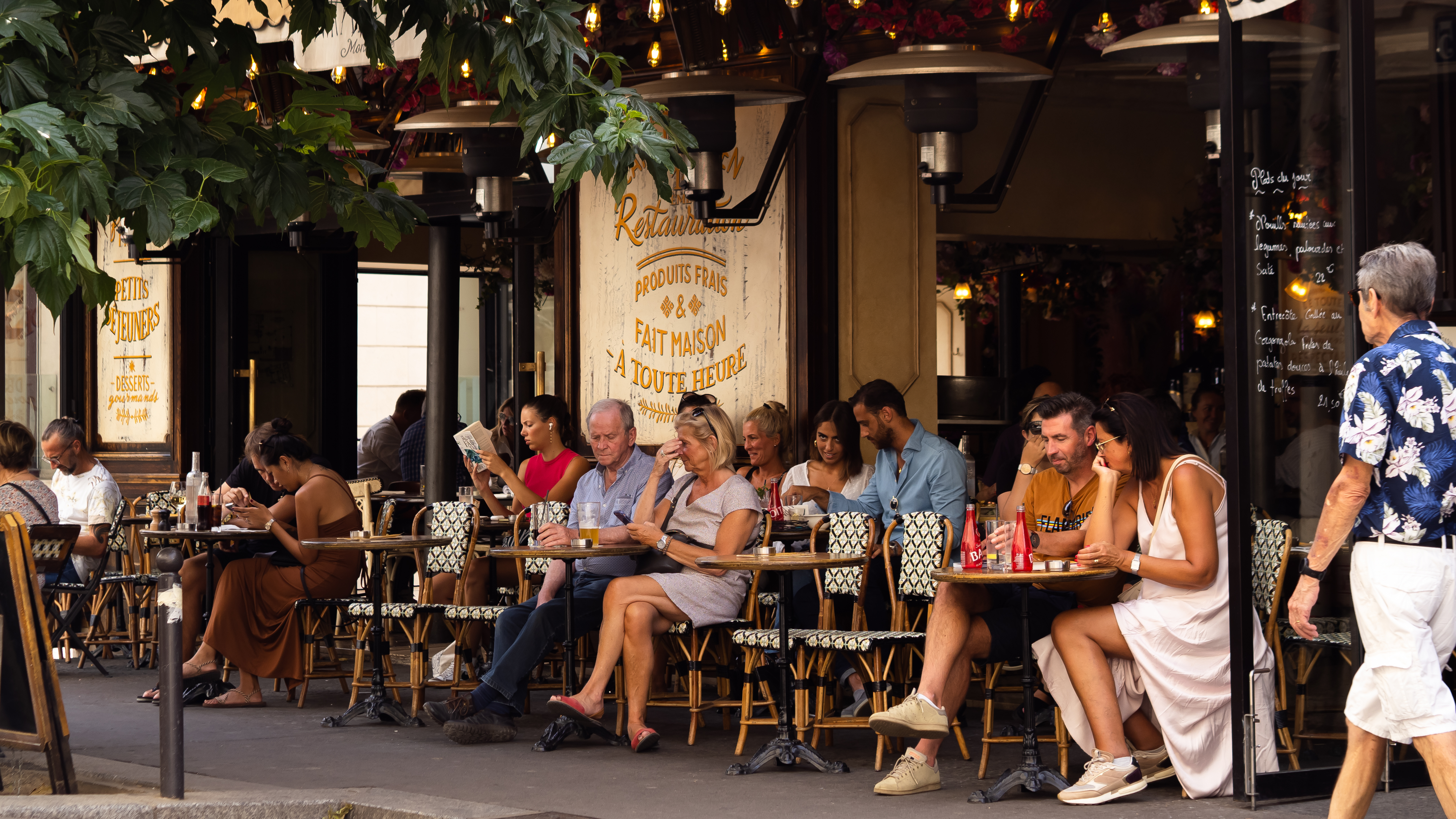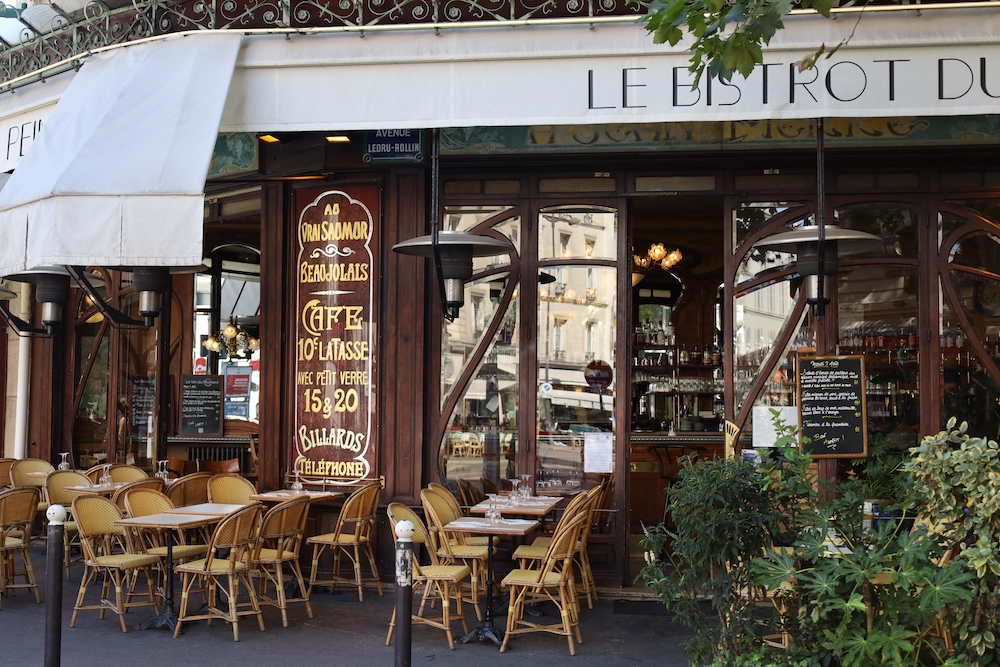
©Salomé Rateau/Le Bonbon
![[SURVEY]: From zinc counters to smartphones, Parisian bistros in danger](https://uploads.lebonbon.fr/source/2024/may/2062764/img-5221_1_2000.jpg)
undefined undefined 14 mai 2024 undefined 11h30
undefined undefined 14 mai 2024 undefined 14h56
More than just places to toast and eat, bistros have always been a true symbol of French culture and places of exchange. But every year, they disappear a little more from the French landscape, thus questioning the future of this precious heritage.

Tavern, cabaret, cafe, drinking den, bouchon, wine bar, bar, zinc counter... Across the years and regions, the bistro has had many different names. In his book A Popular History of Bistros, historian Laurent Bihl states that "its recurring use is estimated from the 1880s". Changing names for a function that has never wavered: to be a place where people, especially the working class at the time, can gather, drink, and eat simply. In fact, when we look up the dictionary for the meaning of the term "bistro", Robert defines it as a place, " generally small and modest ".
But the functions of the bistro are not limited to drinks and food. They have always been a social gathering place, where acquaintances are made, stories are exchanged, and friendships are formed. The bistro has a soul, a character, a history of its own. It is a place where the essence of French culture, conviviality, and gastronomy blend together seamlessly. Whether in a bustling city like Paris or a quaint village in Provence, the bistro remains a timeless symbol of French life.
Bistros are amazing places, full of life and community spirit. They are where you can grab a quick coffee in the morning, enjoy a relaxed lunch, or unwind with drinks after work. Bistros are where stories are shared, friendships are made, and connections are formed. The bistro is a special place with a rich history, steeped in politics and culture. People from all walks of life come together here to discuss, debate, and even change the world. In the 19th century, Napoleon III put them under supervision due to their influence. Icons like Hemingway, Picasso, Chanel, Sartre, and De Beauvoir have graced these spaces, contributing to the vibrant cultural scene. Despite their rich heritage, bistros have faced challenges over the years. They were once incredibly popular, but societal changes and technological advancements have posed threats. The introduction of television in the 60s led to a decline in patronage, as people preferred to stay home. The rise of computers, phones, and social media has further contributed to the decline of these treasured establishments.November 13, 2015, which targeted the terraces of bistros and cafes, have made customers hesitant to frequent these places. "People are aware of the potential danger in cafes and bistros, so they prefer staying at home and interacting with their virtual community. This leads to a trend of social isolation," Alain Fontaine explains. Furthermore, the rise of company restaurants is gradually drawing away the working-class population that used to dine in bistros.
However, the trend seemed to have reversed with the Covid pandemic. Deprived of their places to go out due to repeated lockdowns, the French have once again placed the culture of bistros and cafes at the center of the table. "We realized that it was essential to our life, our living together, our appreciation of others", notes Alain Fontaine. At the same time, the association president has also been working since 2018, alongside his 400 members, on the registration of bistros and cafes as part of French intangible heritage. A first step that would then allow their registration as part of UNESCO's World Heritage. A demanding and long-term task, praised by Laurent Bihl: "It provides the. In less than 10 years, the interest in bistros is experiencing a new wave. Through the work of associations, media representation, and their central role in works of fiction such as "Midnight in Paris," "Amélie ."Poulain," or more recently "Emily in Paris," they are regaining their splendor and attracting a female clientele who now feel safer there. At least in appearance, because the reality is more sober. "We are witnessing the disappearance of a place at a time when it has never been so pleasant and civilized," paradoxically observes Laurent Bihl. For the historian, it is undeniable to see a "cultural rupture" between the heyday of bistros and today. Certainly, today's youth tends to return to the bistro, but this is but a mere hint of the crucial role they could play as culturally important locations, and perhaps convince public services to support them. Shiny like a nostalgia felt for this heritage belonging to a time that is fading, he explains. Now it's about moving forward while trying not to waste this legacy. Are there any solutions to try to ensure the sustainability of bistros? "Give up your phone and go have a drink," jokes the sociologist. While the bistro tradition is at risk, the two men agree that it is not living its last hours. In the provinces more than in the big cities, they could become a vector of sociability at the heart of intelligent rurality. "They would play their role - food, drink - but would also be public services where you could buy bread.Hello there! Isn't it a beautiful day? The sun is shining, the birds are singing, and everything feels just right. Let's take a moment to appreciate the little things that make life so wonderful. Take a deep breath, smile, and let the joy fill your heart. Embrace the positivity and let it guide you through the day. Remember, happiness is a choice, so choose to be happy. May your day be filled with laughter and love. Have a great day! In the midst of these trying times, it's important to stay connected. Perhaps they will succeed in reminding the young people of tomorrow that, as the chief rightly says, "a bistro is like Facebook: we talk and we share." Let's remember to support our local cafes and bistros - they are more than just places to eat and drink, they are part of our culture and history. So let's raise a toast to these beloved establishments and keep them alive for generations to come. Cheers!